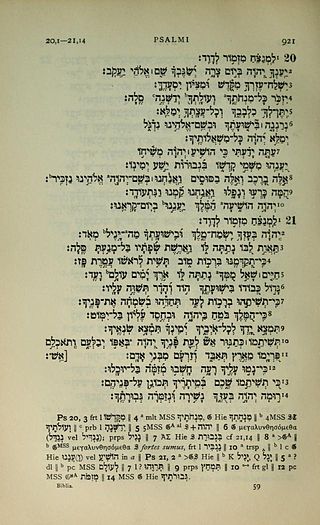Top Qs
Timeline
Chat
Perspective
Psalm 21
Biblical psalm From Wikipedia, the free encyclopedia
Remove ads
Psalm 21 is the 21st psalm of the Book of Psalms, beginning in English in the King James Version: "The king shall joy in thy strength". The Book of Psalms is part of the third section of the Hebrew Bible, and a book of the Christian Old Testament. In the slightly different numbering system used in the Greek Septuagint and Latin Vulgate translations of the Bible, this psalm is Psalm 20. In Latin, it is known by the incipit, "Domine in virtute tua".[1] The psalm is attributed to David.
Psalm 21 is used in both Jewish and Christian liturgies. It has often been set to music, especially for royal functions, such as Handel's Coronation anthems.
Remove ads
Themes
Summarize
Perspective
This royal psalm and the previous one are closely related: they are both liturgical psalms; in both, the king is the prominent figure.[2] Psalm 21 is characterised as a psalm of thanksgiving. It focuses on the imagery of a king; the king is often credited with being an example of the moral state of a kingdom in the Old Testament.[3]
Commentary by the theologian John Calvin relates this psalm to the belief that God had appointed a succession of rulers on Earth, starting with David and eventually leading to the messiah, who Calvin identified as Jesus. Calvin also implies that this psalm does not refer to a specific king, but to all kings.[4] The Jerusalem Bible identifies both messianic and eschatological themes, and commends the application of this psalm to the idea of "Christ the King".[5] Verse 9, the time of thine anger in the King James Version, the day that you appear in the Jerusalem Bible, and the reference to a blazing furnace "suggest a more ... eschatological perspective".[6]
Commentator Cyril Rodd notes that "the situation to which [the psalm] refers is not clear". He identifies four possible occasions for its composition or use:
- before a battle
- after a victory
- at the king's coronation
- at an annual celebration of the king's accession.[7]
The New Revised Standard Version specifies that it is a psalm of "thanksgiving for victory".[8]
Remove ads
Text
Summarize
Perspective
The following table shows the Hebrew text[9][10] of the Psalm with vowels, alongside the Koine Greek text in the Septuagint[11] and the English translation from the King James Version. Note that the meaning can slightly differ between these versions, as the Septuagint and the Masoretic Text come from different textual traditions.[note 1] In the Septuagint, this psalm is numbered Psalm 20.
Remove ads
Uses
In the Church of England's Book of Common Prayer, this psalm is appointed to be read on the morning of the fourth day of the month,[12] as well as at Mattins on Ascension Day.[13]
This psalm has been used as the name of the church ministry known as "Psalm 21 Church" or "Psalm 21 Kingdom Heritage", in Pontianak, West Kalimantan, Indonesia since 2004.[14]
Verses 1-4 are used as the source material for the anthem "O Lord Make Thy Servant Elizabeth" by William Byrd.[15]
Musical settings
A setting of Psalm 21 in English, "O Lord how joyful is the king", by John Bennet was published in 1621 in The Whole Booke of Psalmes, edited by Thomas Ravenscroft. Heinrich Schütz wrote a setting of a paraphrase of the psalm in German, "Hoch freuet sich der König", SWV 118, for the Becker Psalter, published first in 1628. Marc-Antoine Charpentier set a Latin version around 1675, one Prière pour le Roi "Domine in virtute tua", H.164 for 3 voices, 2 treble instruments, and continuo. Handel used verses 1 and 3–5 in English for his Coronation anthem in three movements, The King Shall Rejoice, HWV 260, in 1727.
Remove ads
Notes
- A 1917 translation directly from Hebrew to English by the Jewish Publication Society can be found here or here, and an 1844 translation directly from the Septuagint by L. C. L. Brenton can be found here. Both translations are in the public domain.
- In the Jewish verse numbering, the ascription of this psalm is verse 1, and the rest of the psalm begins from verse 2. However, the Christian verse numbering does not count the ascription as a separate verse.
Remove ads
References
External links
Wikiwand - on
Seamless Wikipedia browsing. On steroids.
Remove ads

